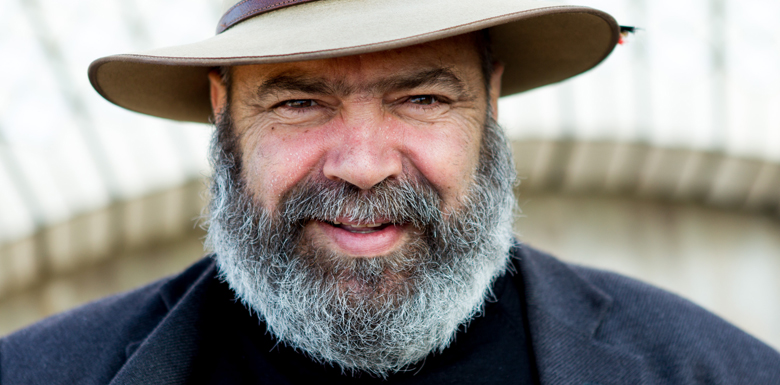
The two year fellowship worth $90,000 will help Richard script and score an ambitious musical based on Aboriginal and Torres Strait Islander Australian history. Combining writing, film and music, the production will tell the story of ‘Indigenous Australians from invasion to today’, in a stage musical to be offered to theatre companies in 2014. “I’m excited about combining music, film and writing because it can expand our voices in a whole lot of different ways, and allow us to tell our stories in tremendous ways because we have wonderful heroes,” he says. “The other side is for wider Australia to recognise us a great people despite what’s been done to us, to recognise that we have weathered the worst of storms and still we are achieving.”
For Richard art whether it’s music, stage, film or writing, means freedom and using your voice. With that comes responsibility. “I use my voice in as many different ways as I can because our people had no voice for so long. I use my voice for healing. There have been so many healers and warriors in our history. My grandfather was Reg Saunders, the first Aboriginal Australian to be commissioned as an officer in the Australian army. My aunties and uncles were heroes. My mum fought the mining companies for our land – all of these wonderful people, and my children, are golden souls who have stood up and they encourage and inspire me,” he says.
Richard’s biography is impressive. He’s finishing a play for the Malthouse to be directed by Wayne Blair of the Sapphires’ fame. He’s also just finished writing a book on national identity, and over the past two years has delivered more than 400 lateral violence workshops. Lateral violence is a subject he’s passionate about addressing. “When you’re on the bottom of the ladder, anger goes to the side and you end up hurting each other. There’s a role to educate each other on what lateral violence is and to contain and control the anger. Central in this, is recognising the greatness in each other and to listen and hear each other rather than turn on each other,” he says.
Despite the seriousness that surrounds his art, Richard has learned over the years to experience the joy of the simple things in life. “When I’ve been on the road and have established healing circles, and I cross that cattle grid home to my country, and I see the light on at home – my children come out to cuddle me and I hear the old dog barking and the voices of my family – well that’s pretty awesome. He’s thankful for the fellowship and is not daunted by the hard work ahead to produce the musical. “It means I’ve been trusted to do a job and tell our story the best possible way I can. I hope that when it’s finished to be sitting in the audience watching our people burst with pride. I also hope that it might inspire our curriculum, so that our little ones can shine with pride at school too.” For Richard, serving his people is the greatest honour he can have. “Art soothes the scars on our soul. It was shameful, the things that have been done but we have lots of heroes out there in all shapes and sizes. They’re everywhere you look – they work against corruption and save lives. They’ve pushed their way forward despite the massive cultural load we’ve had to carry and the pain we live under.”
Richard has written, directed and produced more than 50 film and video projects. As a musician he formed the Charcoal Club and once supported US star Prince. His work as a field officer with the Royal Commission into Aboriginal Deaths in Custody inspired his award-winning play Conversations with the Dead. A Gunditjmara man raised in south-western Victoria, Richard Frankland has long been recognised for his passionate advocacy of social justice in writing, film and music.
Comments are closed.